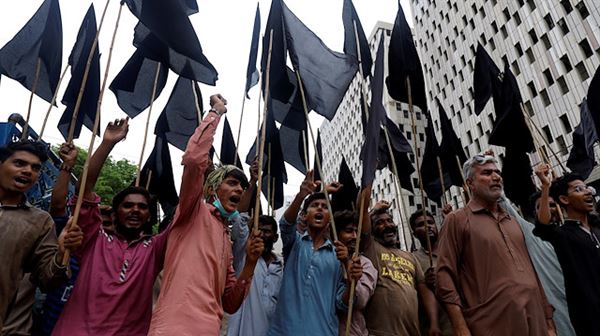Pakistan on Sunday marked "Black Day" to show solidarity with the people of Jammu and Kashmir on the 72nd anniversary of the dispute over the region.
Pakistan on Sunday marked “Black Day” to show solidarity with the people of Jammu and Kashmir on the 72nd anniversary of the dispute over the region.
The day began with a moment of silence, bringing traffic across the country to a halt for a minute as a mark of solidarity and support for Kashmiris under Indian rule.
Special morning prayers were offered in mosques for those who lost their lives in the conflict in Indian-administered Jammu and Kashmir.
Political, social, and human rights activists held rallies in major cities such as Karachi, Lahore, Islamabad, Peshawar, and Muzaffarabad to protest the “illegal occupation” of the valley and demand the UN lift the curfew and communication blockade and implement its relevant resolutions on Kashmir.
A large rally was held in Muzaffarabad, the capital of Pakistani- administered Azad Jammu and Kashmir, attended by thousands of people, including Raja Farooq Haider, the region’s prime minister.
On Oct. 27, 1947, Indian troops positioned themselves in Kashmir’s largest city, Srinagar, after India and Pakistan gained their independence from British colonial rule. The anniversary of this Indian action is observed by Pakistanis and Kashmiris as “Black Day,” while India commemorates it as “Accession Day.” The region has been a source of tension between India and Pakistan ever since.
In 1989, Kashmiri resistance groups launched a campaign for independence or unification with Pakistan, leading to more than 70,000 deaths, according to several human rights group.
In separate messages, Pakistan’s president and prime minister reiterated their unflinching diplomatic, moral and political support for the cause of the people of Kashmir.
“Since August 5th this year, India has imposed an inhuman lockdown over 8 million people in occupied Kashmir, and Indian occupying forces are perpetrating unspeakable crimes against Kashmiri people, including women and children, with complete impunity,” President Arif Alvi said in his message.
Premier Imran Khan said the Kashmir Black Day being observed in Pakistan and across the world today is unlike its predecessors.
“On 27 October 1947, India had illegally occupied Jammu Kashmir and, on 5 August this year, it took further steps to unilaterally alter the disputed status of the territory and change its demographic structure and identity,” Khan said in his message.
Blasting the Indian government actions, Khan said through the deployment of additional troops and an unprecedented media and communications blackout, Indian-administered Jammu and Kashmir has been turned into the largest “prison” on the planet
– Disputed region
Indian-administered Jammu and Kashmir has been under a near-complete lockdown since New Delhi’s move on Aug. 5 scrapping the region’s special status.
Several rights groups including Human Rights Watch and Amnesty International have repeatedly called on India to lift restrictions and release political detainees.
India said that 93% of the restrictions have been eased in the conflict-ridden region, a claim that Anadolu Agency could not independently verify.
From 1954 until Aug. 5, 2019, Jammu and Kashmir enjoyed special status under the Indian Constitution which allowed it to enact its own laws.
The provisions also protected the region’s citizenship law, which barred outsiders from settling in and owning land in the territory.
Some Kashmiri groups in Jammu and Kashmir have been fighting against Indian rule for independence, or for unification with neighboring Pakistan.
India and Pakistan both hold Kashmir in parts and claim it in full. China also controls part of the contested region, but it is India and Pakistan who have fought two wars over Kashmir.
